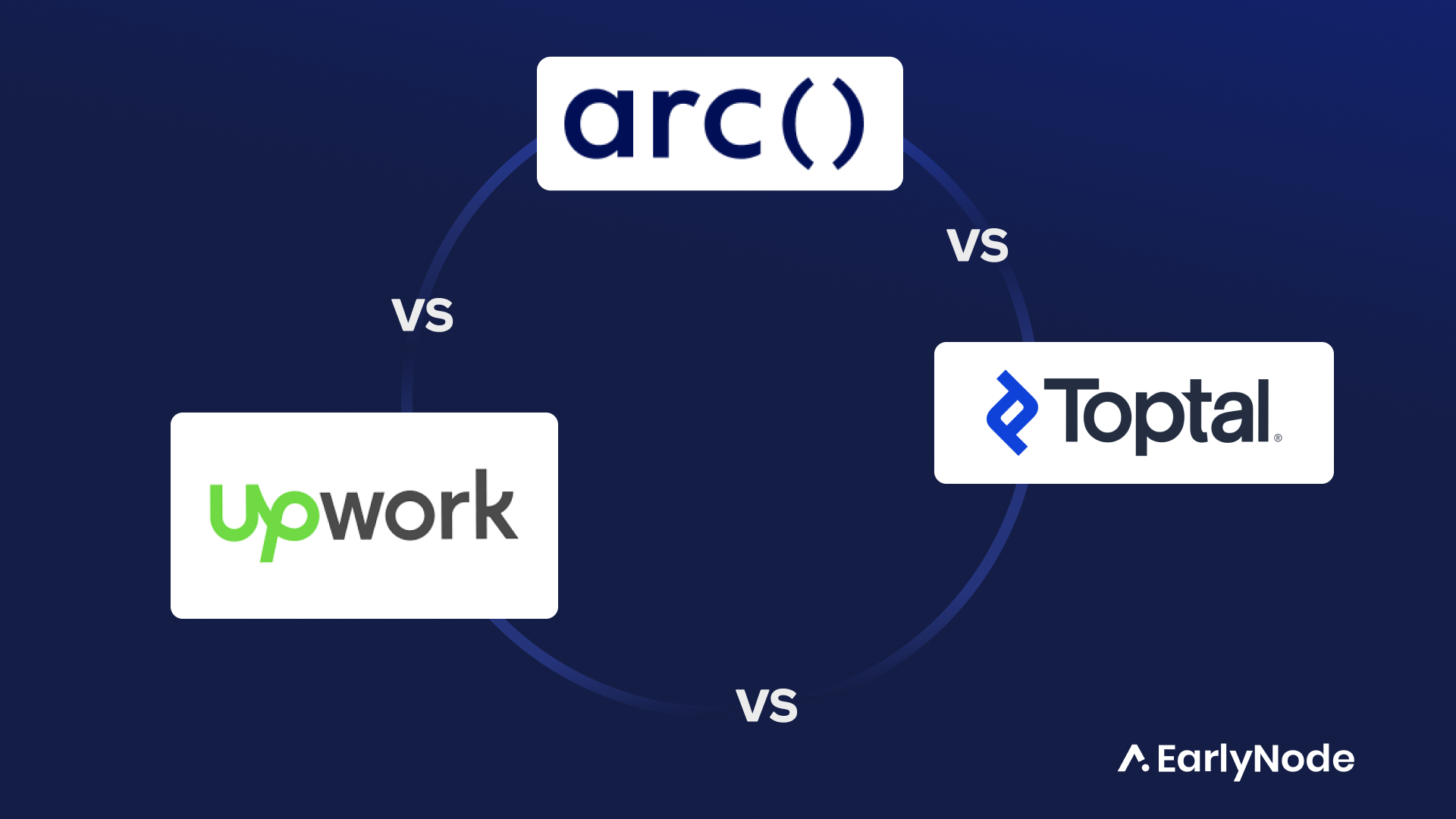Augmentation vs Freelance Team vs In-house: Best Model For Hiring Developers

TL;DR
Staff Augmentation: Contracting temporary employees through an external agency who work under your direction. Allows you to scale team size and minimize long-term financial commitments.
Freelance Team: Self-employed individuals hired on a project or hourly basis, offering specialized skills for specific tasks without incurring regular employment costs.
In-House Hiring: Employing full-time staff who are deeply integrated into your company culture, fostering long-term stability and allowing direct control over projects.
Pros of Staff Augmentation:
- Easily adjust team size based on project requirements.
- Avoids the overhead of long-term commitments and benefits associated with full-time staff.
- Temporary staff can start asap and adapt quickly to new environments.
- The least time-consuming model for recruiting as the staffing agency handles the vetting of developers
Best Use Scenarios for Staff Augmentation:
- Quick access to skilled personnel.
- Flexibly scale workforce during fluctuating demand.
- Quickly replace a departing specialist without losing steam in critical projects.
Why Choose Staff Augmentation:
- Provides dependable professionals managed within your team, reducing risks of inconsistency.
- Since employees are on the agency’s payroll, your startup avoids the complexities of direct employment.
- Ideal for startups: It’s a flexible hiring strategy that helps startups save a ton of time finding skilled workers without the hassle of full-time employment or the uncertainty of freelancers.
Building the perfect team for your startup isn’t just about filling vacant positions—you must choose the right way to bring talent aboard. As a founder, do you tap into the freelance market, partner with a staff augmentation agency, or bring on full-time in-house experts? The decision can make or break your company’s agility and growth.
In this article, we’ll unpack the pros and cons of each hiring model, giving you the insights needed to staff your startup smartly and steer it toward success.
What Does Staff Augmentation Mean?
Staff augmentation involves contracting with an external agency that provides temporary employees who work for you. These employees remain on the agency’s payroll but work full-time on your projects, following your startup’s processes and using your tools.
Imagine your startup needs to quickly scale up a software development team to meet a project deadline. You need skilled developers familiar with the latest technologies but don’t have the time or resources to handle the recruitment and administrative tasks. You contract a staff augmentation agency that finds and places 5 developers with your team for the project’s duration.
Within days, your beefed-up team gets up and running, and you complete the project on time with a day to spare. That’s the power of staff augmentation.
Pros of Staff Augmentation
- Flexibility: Easily scale your team size up or down based on project needs.
- Cost-effective: No long-term commitments or benefits typically associated with full-time employees.
- Quick integration: Developers can start quickly and are used to adapting to new environments.
- Faster recruiting process: The staffing agency finds and vets developers ahead of time. This means you spend little time hiring because all you have to do is choose.
Cons of Staff Augmentation
- Less control over staff selection: You rely on the agency’s judgment for the quality of candidates.
- Potential for less loyalty: Augmented staff may not feel as much allegiance to your company culture or long-term goals.
What Does It Mean to Hire a Freelance Team?
Freelancers are self-employed individuals who work on a contractual basis for specific tasks or projects. You pay them per project or hourly, and they handle their own taxes and benefits. A freelance team is simply you hiring several freelancers to work together as a team.
For instance, your startup needs a new mobile app. Instead of hiring a full-time developer, you hire 2 freelance app developers to build the app for a set fee. The freelancers work remotely, use their own tools, and you communicate requirements and feedback through virtual meetings and email.
Pros of Hiring Freelance Developers
- Specialized skills: Ideal for projects needing a specific skill set that your in-house team lacks.
- Cost savings: Avoid ongoing employment costs like health benefits and paid leave.
- Flexibility: Engage freelancers when needed without the commitment of full-time staff.
Cons of Hiring Freelance Developers
- Less oversight: Freelancers work independently, which can sometimes lead to miscommunications or differences in the project’s direction.
- Availability issues: Freelancers may juggle multiple clients and might not always be available when needed.
- Finding and vetting good freelance developers takes a lot of time and effort, which makes it a pain.
What Does It Mean to Hire In-House?
This traditional employment model involves hiring employees who work solely for your company, typically on-site, and are fully integrated into your company culture.
Let’s say you are developing a proprietary piece of software that will be core to your business. You can hire a team of full-time developers who will work from your office. These employees will develop the software and handle updates, maintenance, and customer support.
Pros of The In-House Model
- Company culture: Full-time employees are more likely to be committed to your company’s mission and values.
- Long-term investment: Build a stable, committed team that grows with your company.
Cons of The In-House Model
- Higher costs: You are responsible for salaries, taxes, equity packages, and potential severance costs if the relationship ends.
- Less flexibility: Scaling down involves layoffs, which can be costly and affect morale.
Augmentation vs Freelance Team vs In-House Compared
Even with these pros and cons listed, choosing might still be tough. So, let’s compare the three models side by side.
Best Option for Different Scenarios
Under certain circumstances, one hiring model can be the best option compared to the other two. These are the best options we recommend for any of the scenarios below:
The Best Model for Hiring Developers
Staff augmentation is a flexible hiring solution that helps avoid some common issues with hiring freelancers and full-time employees.
Unlike freelancers, who might not always be reliable or available, staff augmentation gives you dependable professionals managed by your own team, reducing the risk of inconsistencies.
It also dodges the high costs and administrative headaches of hiring full-time employees because an agency, not your company, technically employs these workers. This means you can easily adjust your team size as needed without worrying about the complications of layoffs.
This is especially common for VC-backed startups. You can never tell how fast you can raise your next funding. Augmentation makes it easy to reduce your staff if you end up in a situation where you need to slash your burn suddenly.
Overall, staff augmentation is the ideal choice for startups that need skilled talent who can quickly adapt to their evolving needs on a reasonable budget.
What We Recommend
If you’re considering staff augmentation, look no further than ReactSquad, the React developer agency that offers vetted and experienced React developers for hire.
Why We Recommend
- Unlike other alternatives, ReactSquad is fully focused on one specific tech stack (React & Node.js). Their developers have high expertise and a niche focus on SaaS products
- Reactsquad has a rigorous vetting process for their developers; with 4 interview rounds and 4 weeks working on a paid test project
- Senior developers with 5+ years experience
- Startup-friendly rates (starting from $75/hr)
- 7-day free trial with your matched developer and a replacement guarantee at any point during your project
- You can hire React devs for short and long-term SaaS projects and pay on a month-to-month basis
Visit ReactSquad’s website to get matched with the best React developers for your SaaS startup.




